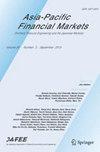The Asymmetric Effects of Exchange Rate Volatility on Pakistan–Japan Commodity Trade: Evidence from Non-linear ARDL Approach
Abstract
The current research delves into the implications of exchange rate fluctuations on commodity trade between Pakistan and Japan, utilizing the nonlinear autoregressive distributed lag method. While prior studies have predominantly utilized the symmetric cointegration approach, the current study posits that the limited assumption of symmetry between the exchange rate and the trade flows could have hindered the empirical findings. The research investigates both the symmetric and asymmetric effects of exchange rate fluctuations on 102 Pakistani industries that import from Japan and 62 industries that export to Japan at the industry level from 1980 to 2020. The outcomes indicate that in nearly half of the importing and exporting industries that engage in trade with Japan, there is evidence of a significant impact of asymmetric exchange rate fluctuations on trade flows in both the short and long term. The study suggests that policymakers should consider the industry-specific impact of exchange rate fluctuations on trade flows and implement targeted policies accordingly. Particularly, industries that benefit from currency depreciation should be encouraged through export incentives, while industries negatively affected by currency volatility should be provided with hedging mechanisms and other forms of support to mitigate their losses.

 求助内容:
求助内容: 应助结果提醒方式:
应助结果提醒方式:


